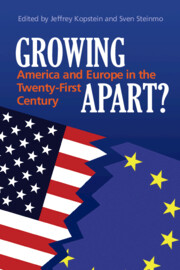Book contents
- Frontmatter
- Contents
- Contributors
- Acknowledgments
- Growing Apart?
- Introduction: Growing Apart? America and Europe in the Twenty-First Century
- 1 The Religious Divide: Why Religion Seems to Be Thriving in the United States and Waning in Europe
- 2 Value Change in Europe and North America: Convergence or Something Else?
- 3 On Different Planets: News Media in the United States and Europe
- 4 One Ring to Bind Them All: American Power and Neoliberal Capitalism
- 5 Spreading the Word: The Diffusion of American Conservatism in Europe and Beyond
- 6 Work, Welfare, and Wanderlust: Immigration and Integration in Europe and North America
- 7 Lost in Translation: The Transatlantic Divide over Diplomacy
- 8 The Atlantic Divide in Historical Perspective: A View from Europe
- Index
1 - The Religious Divide: Why Religion Seems to Be Thriving in the United States and Waning in Europe
Published online by Cambridge University Press: 19 January 2010
- Frontmatter
- Contents
- Contributors
- Acknowledgments
- Growing Apart?
- Introduction: Growing Apart? America and Europe in the Twenty-First Century
- 1 The Religious Divide: Why Religion Seems to Be Thriving in the United States and Waning in Europe
- 2 Value Change in Europe and North America: Convergence or Something Else?
- 3 On Different Planets: News Media in the United States and Europe
- 4 One Ring to Bind Them All: American Power and Neoliberal Capitalism
- 5 Spreading the Word: The Diffusion of American Conservatism in Europe and Beyond
- 6 Work, Welfare, and Wanderlust: Immigration and Integration in Europe and North America
- 7 Lost in Translation: The Transatlantic Divide over Diplomacy
- 8 The Atlantic Divide in Historical Perspective: A View from Europe
- Index
Summary
Introduction
In the decades following the Second World War, most social scientists expected convergence among the Western industrial democracies. Modernization was expected to bring prosperity and opportunity, initiating a “culture shift” to posttraditional values and lifestyles.
However, in recent years observers have remarked on a growing divide between Europeans and Americans. This divergence may be nowhere greater than in the religious sphere. While faith is loudly proclaimed and a bustling diversity of religious organizations jostles for attention in all arenas of public life in the United States, the European Union (EU) is described as thoroughly secularized, comprised of societies in which religion occupies an ever-shrinking private role.
Secularization theory was long the dominant perspective on religious change. It maintains that modernization erodes religion's plausibility, intensity, and authority. Further, the theory posits the retreat of sacred institutions, the privatization of faith, and the “progressive shrinkage and decline of religion” in public life. As political scientist Ronald Inglehart explains, “Modernization theorists … have argued that the world is changing in ways that erode traditional values. Economic development almost inevitably brings the decline of religion, parochialism and cultural differences.” In fact, crossnational research suggests a negative association between development and religiosity.
Nevertheless, the contemporary vitality of religion in the United States and other countries has led to a reappraisal. Peter L. Berger, once a prominent proponent of the secularization thesis, recently announced, “Our age is not an age of secularization.
- Type
- Chapter
- Information
- Growing Apart?America and Europe in the 21st Century, pp. 24 - 52Publisher: Cambridge University PressPrint publication year: 2007
- 2
- Cited by



